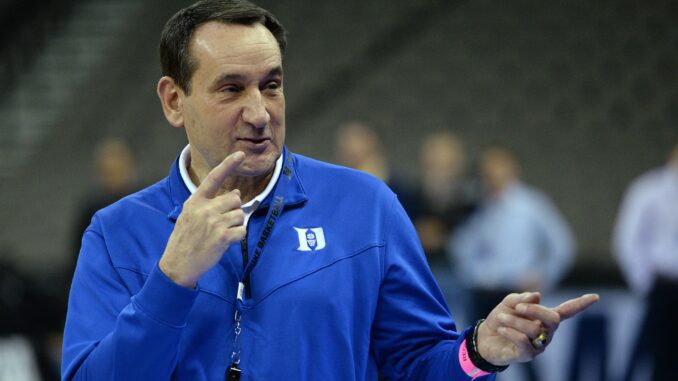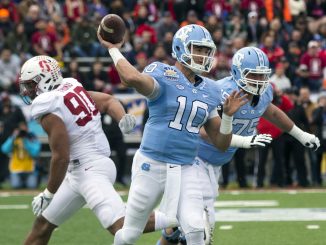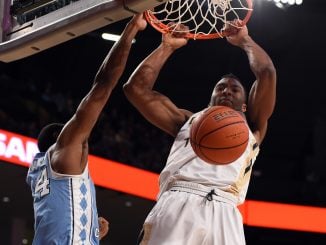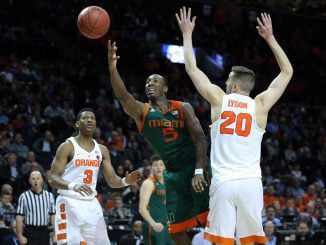
Let’s say a five-star high school point guard grew up hearing stories about Dean Smith. So, when he takes his unofficial visit to UNC, and his host, Luke Maye, asks him what he’d like for lunch, he answers without hesitation: “I want a grilled cheese from Merritt’s!”
The mom-and-pop restaurant, located just off campus, was Smith’s favorite, and he frequently gave staff members his car keys to pick him up a grilled cheese.
Maye and the recruit can’t go there, however — not on an official visit. It would be an NCAA violation — but not for any of the reasons that might come immediately to mind. The recruit is allowed to go to lunch while on a visit, as long as he pays. He’s even allowed to be accompanied by a current player on the team.
No, the problem with this scenario is the location. Merritt’s is located about 1.6 miles from the UNC campus, and NCAA bylaws 13.1.2.5 and 13.7.4 clearly spell out the requirements — prospects can go off campus on an unofficial visit, but only within a one-mile radius. On an official visit, they can stray as much as 30 miles off campus.
Try another one: An incoming wide receiver from Las Vegas calls the NC State football office shortly before freshman orientation with a change in plans. Plane flights into Fayetteville’s airport are about $200 cheaper than if he flies into RDU. So, can the car the school was going to send to pick him up please come to that airport, instead?
It can’t. That would be a violation of bylaw 13.5.4, which limits schools to picking up student-athletes from the nearest major airport, train or bus station.
How about this one: A football recruit on an unofficial visit to Duke requests three tickets to an early-season basketball game being played that same day.
Not a problem. Players on unofficial visits can request up to three complimentary tickets to any home athletics contest, according to bylaw 13.7.2.2.
Confusing? Very. That’s why every coach and assistant is required to pass a certification test on NCAA regulations before they’re allowed to recruit off campus. The timed, multiple-choice test is administered by the school’s compliance staff and overseen by the conference. There are separate tests for prospective coaches in football, basketball and all other sports.
There’s a lot to learn. The test outline provided as part of the prep materials is nine pages long and includes 150 separate bullet points, referring to various bylaws, covering everything from when a coach allowed to speak to a recruit at a summer tournament — not until his final game is completed — to whether the team can set aside a parking spot for a recruit on an unofficial visit — nope.
To help prospective recruiters prepare, the NCAA provides practice exams online, and, for some reason, they allow just anyone to take them.
It’s always good to have a fallback career, so I decided to take the tests — all three of them. I’ve covered college sports for years, including high-profile NCAA investigations. I’m familiar with the major regulations regarding recruiting — phone call limits, official and unofficial visits, you name it. I knew that team media guides were all exactly 208 pages, because, for some reason, the NCAA put a limit on the page count.
There was a one-hour time limit to complete 30 multiple choice questions, and a passing score was 80 percent. How hard could it be?
The short answer: Absolute carnage. I took the all-sports test first, and I scored a 63. In addition to the one-mile grilled cheese rule and the Fayetteville airport violation, I mistakenly thought that recruits couldn’t make an unofficial visit to a campus during a dead period. It seemed to be one of the primary definitions of a dead period. A recruit can visit, however, if he or she is already committed to the school — a designation I thought was meaningless, except to recruiting websites.
I also didn’t know that limits on the number of times coaches could call recruits went away after the recruit committed.
I remembered Coach K committing a minor violation when he talked to Alex Poythress at the wrong time during a summer tournament, but it turned out I had no idea when the right time to talk to him would have been.
So I decided to focus on just one sport, instead of trying to get certified in all of them. Surely, I’d do better on the football-specific exam, or the basketball-specific one.
I scored a 56 percent on football. After reviewing my right and wrong answers to the first two tests (a practice that the directions specifically forbid), I did much better on the basketball one — a still-failing 76 percent.
I didn’t know that the spring evaluation period was 168 days, which is more than five months — far longer than any spring I’ve ever seen.
“Can a school arrange employment for a recruited prospective student within the athletic department ticket office?” Well, that one’s a layup. Athletes can’t have jobs anywhere, period. And clearly, working FOR the athletic department would be outlawed.
Well, actually, according to bylaw 13.2.4.3, they can do that.
I didn’t know that recruits on visits could get extra tickets for stepdads and stepmoms if their parents were divorced, a fair, athlete-centered rule that makes sense. Also, coaches are prohibited from attending all-star games, a rule that doesn’t.
This doesn’t mean a premature end to my coaching career, however. I can still make phone calls to recruits. I just am not allowed to recruit off campus.
The tests show that the NCAA rulebook is confusing and contradictory, with rules covering the type of paper used for handwritten letters, parking spots for parents and when coaches can attend funerals for a recruit’s family member.
It’s painfully easy to commit a violation simply by overlooking an obscure rule, or by relying on common sense.
It’s also painfully difficult to pass the certification test, unless you’re very familiar with the dos and don’ts of your prospective job, meaning a more skeptical view of the intentions behind violations, even minor ones.



